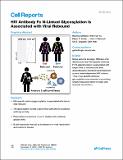| dc.contributor.author | Offersen, Rasmus | |
| dc.contributor.author | Yu, Wen-Han | |
| dc.contributor.author | Scully, Eileen P | |
| dc.contributor.author | Julg, Boris | |
| dc.contributor.author | Euler, Zelda | |
| dc.contributor.author | Sadanand, Saheli | |
| dc.contributor.author | Garcia-Dominguez, Dario | |
| dc.contributor.author | Zheng, Lu | |
| dc.contributor.author | Rasmussen, Thomas A | |
| dc.contributor.author | Jennewein, Madeleine F | |
| dc.contributor.author | Linde, Caitlyn | |
| dc.contributor.author | Sassic, Jessica | |
| dc.contributor.author | Lofano, Giuseppe | |
| dc.contributor.author | Vigano, Selena | |
| dc.contributor.author | Stephenson, Kathryn E | |
| dc.contributor.author | Fischinger, Stephanie | |
| dc.contributor.author | Suscovich, Todd J | |
| dc.contributor.author | Lichterfeld, Mathias | |
| dc.contributor.author | Lauffenburger, Douglas | |
| dc.contributor.author | Rosenberg, Erik S | |
| dc.contributor.author | Allen, Todd | |
| dc.contributor.author | Altfeld, Marcus | |
| dc.contributor.author | Charles, Richelle C | |
| dc.contributor.author | Østergaard, Lars | |
| dc.contributor.author | Tolstrup, Martin | |
| dc.contributor.author | Barouch, Dan H | |
| dc.contributor.author | Søgaard, Ole S | |
| dc.contributor.author | Alter, Galit | |
| dc.date.accessioned | 2021-10-27T20:31:00Z | |
| dc.date.available | 2021-10-27T20:31:00Z | |
| dc.date.issued | 2020 | |
| dc.identifier.uri | https://hdl.handle.net/1721.1/136136 | |
| dc.description.abstract | © 2020 The Authors Changes in antibody glycosylation are linked to inflammation across several diseases. Alterations in bulk antibody galactosylation can predict rheumatic flares, act as a sensor for immune activation, predict gastric cancer relapse, track with biological age, shift with vaccination, change with HIV reservoir size on therapy, and decrease in HIV and HCV infections. However, whether changes in antibody Fc biology also track with reservoir rebound time remains unclear. The identification of a biomarker that could forecast viral rebound time could significantly accelerate the downselection and iterative improvement of promising HIV viral eradication strategies. Using a comprehensive antibody Fc-profiling approach, the level of HIV-specific antibody Fc N-galactosylation is significantly associated with time to rebound after treatment discontinuation across three independent cohorts. Thus virus-specific antibody glycosylation may represent a promising, simply measured marker to track reservoir reactivation. | en_US |
| dc.language.iso | en | |
| dc.publisher | Elsevier BV | en_US |
| dc.relation.isversionof | 10.1016/J.CELREP.2020.108502 | en_US |
| dc.rights | Creative Commons Attribution 4.0 International license | en_US |
| dc.rights.uri | https://creativecommons.org/licenses/by/4.0/ | en_US |
| dc.source | Elsevier | en_US |
| dc.title | HIV Antibody Fc N-Linked Glycosylation Is Associated with Viral Rebound | en_US |
| dc.type | Article | en_US |
| dc.contributor.department | Ragon Institute of MGH, MIT and Harvard | |
| dc.contributor.department | Massachusetts Institute of Technology. Department of Biological Engineering | |
| dc.relation.journal | Cell Reports | en_US |
| dc.eprint.version | Final published version | en_US |
| dc.type.uri | http://purl.org/eprint/type/JournalArticle | en_US |
| eprint.status | http://purl.org/eprint/status/PeerReviewed | en_US |
| dc.date.updated | 2021-09-07T16:55:24Z | |
| dspace.orderedauthors | Offersen, R; Yu, W-H; Scully, EP; Julg, B; Euler, Z; Sadanand, S; Garcia-Dominguez, D; Zheng, L; Rasmussen, TA; Jennewein, MF; Linde, C; Sassic, J; Lofano, G; Vigano, S; Stephenson, KE; Fischinger, S; Suscovich, TJ; Lichterfeld, M; Lauffenburger, D; Rosenberg, ES; Allen, T; Altfeld, M; Charles, RC; Østergaard, L; Tolstrup, M; Barouch, DH; Søgaard, OS; Alter, G | en_US |
| dspace.date.submission | 2021-09-07T16:55:27Z | |
| mit.journal.volume | 33 | en_US |
| mit.journal.issue | 11 | en_US |
| mit.license | PUBLISHER_CC | |
| mit.metadata.status | Authority Work and Publication Information Needed | en_US |
